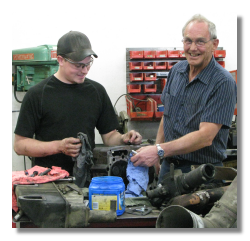 NMCC's trade and technical occupations department offers a wide range of programs. The majority of the programs offer an associate’s in applied science degree or a certification option. Welding and Metal Fabrication is offered at the certificate level only. Wind Power Technology is offered as an associate’s in applied science degree only. NMCC's trade and technical occupations department offers a wide range of programs. The majority of the programs offer an associate’s in applied science degree or a certification option. Welding and Metal Fabrication is offered at the certificate level only. Wind Power Technology is offered as an associate’s in applied science degree only. Most programs are grouped into three major cluster areas. Mechanical trades include Automotive Collision Repair, Automotive Technology and Diesel Hydraulics Technology. Electrical/electronics includes Computer Electronics, Electrical Construction and Maintenance and Wind Power Technology. The building trades cluster consists of Computer-Aided Drafting Technology, Electrical Construction & Maintenance, Plumbing & Heating, Residential Construction, as well as Welding & Metal Fabrication. In the Precision Metals Manufacturing program students are involved in all aspects of the machining process. Each program requires a broad-based education centered on a core curriculum including technical specialty and general education courses. The associate degree level requires the most credits for completion and involves more demanding related courses, particularly in mathematics and physical sciences. The certificate level includes technical course work and a math and/or English course. Male and female graduates find that this preparation provides them added flexibility in their careers, enabling them to adapt readily to new task and work environments. |





